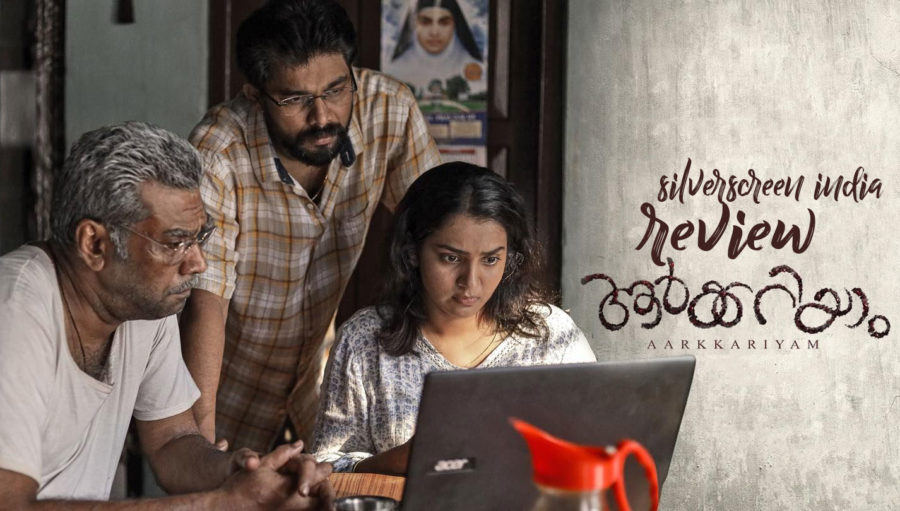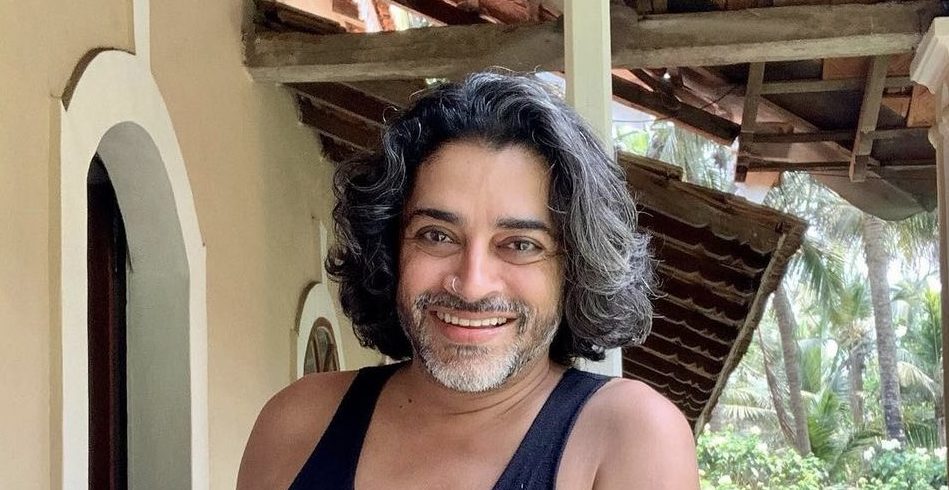Director: Sanu John Varughese
Cast: Biju Menon, Sharaf-U-Dheen, Parvathy
Spoiler Alert
In early 2020, just before Covid-19 protocols were implemented in India, a couple in their 30s prepares to leave their Mumbai apartment for Pala, the woman’s native village in Kerala. Besides concerns over the long drive to Kerala during the pandemic, the couple face a more crucial problem – a financial crisis threatening to break off a long-standing friendship.
The opening sequence of Aarkkariyaam (Who knows!) moves between this grim scene of home-leaving and warmer vignettes of a patriarch preparing to welcome the couple into his lonely yet strangely content existence in an old house with a sprawling green backyard. We follow him plodding through the house, looking for spots to be cleaned and windows to be opened. He breaks his lent to suit the tastes of the young guests. He quarrels with a kind young neighbour who helps him out in the kitchen – something that has come to be a routine – but today, he wraps it up by humming a vintage tune. The wrinkles on his face and his sunken eyes are hesitant to express it, but Ittiyevara (Biju Menon), a retired mathematics teacher, is in a good mood today.
One of the starkest changes that came over Malayalam cinema post-2010 was films that placed style over substance; ones that featured flashy camera movements and editing techniques that constantly drew attention to themselves. Aarkkariyam, directed by cinematographer-turned-director Sanu John Varughese, lies on the other end of this spectrum, where the form is so subdued that modesty becomes the movie’s fatal flaw.
Sanu has the methodical approach of a film school student, staying away from mainstream tendencies, even in places that call for dramatic intervention of camera and sound. The result is a monotonous narrative that beats around the bush.
The most affecting moments in the film are the scenes that illustrate the close relationship shared by the three characters. They cook together in their humble kitchen, inspect the orchard for ripe fruits, and watch religious shows on television. The narrative has a gorgeously grainy texture.
In the images that act as a period-marker and as devices of nostalgia and idyll, Sanu inserts the story’s organs. The instance of Roy (Sharaf-U-Dheen) walking up to Ittiyevara’s room at night and pausing upon spotting the father’s long shadow in prayer. The trio walking through the plantation, discussing life, towards a picturesque quarry pond where the patriarch has his daily bath. The film asks the audience to notice every detail on the screen, albeit presented mutedly and make assumptions on why the characters do what they do.
Gradually, Sanu and his writers (Rajesh Ravi, Arun Janardhanan) reveal the information that makes up the background. An ex-husband. A secret buried in the backyard, weighing on Ittiyevara’s chest for over a decade. Sanu does not shoot the viewer with this information but coolly tosses it into a conversation between the father and the son-in-law, hoping that the unlikely casualness would shake up the audience. But it does not. The narrative stays still, refusing to shift gear.
More slender than the film’s way of showing things is its subtext about the morality of killing within a pious environment and the human need for closure. As the title might suggest, ambiguity is the fundamental quality of Aarkkariyaam. Every discussion ends abruptly, leaving behind a train of vaguely expressed thoughts. We do not know if the murder was a definite act or an accident that happened in the heat of the moment. The film does not delve deeper into it.
Roy’s search for a murdered man’s past comes across as a pointless long-winded exercise. What he seeks to know, the film never clarifies. An investigation is not something a man like him, not as religious as his wife or adventurous as his father-in-law, might take up.
Sanu succeeds in bringing together a great cast, led by an excellent Biju Menon. He plays Ittiyevara with so much emotional depth, emanating a sense of wisdom that seems to spill into life offscreen. He is utmost natural, at one with the house and the surroundings as though he has known it forever. He holds the film together even in the scenes where he is underplaying.
Recommended
Parvathy, for once, keeps her tendency to hog the limelight in control and delivers a charming performance. Among the small bunch of supporting actors, Pramod Veliyanad, an ace theatre artiste who plays Bhasi, a local man who assists Ittiyevara in farm labour, stands out for his manners and a singular way of speaking. Veliyanad’s thoroughly grounded performance comes off as at once impulsive and thoughtful, adds to the film’s lived-in texture.
Aarkkariyaam might be appreciated best as a curation of pieces of idyllic rural life during a pandemic that has sent the world into a tizzy. Despite the overarching detachment that stems from its aesthetic style, the film manages to fill the viewer with a sense of warmth. It is not perfect people that make up perfect families, but the wounds they share and survive together.
*****
The Aarkkariyaam review is a Silverscreen original article. It was not paid for or commissioned by anyone associated with the film. Silverscreenindia.com and its writers do not have any commercial relationship with movies that are reviewed on the site.



